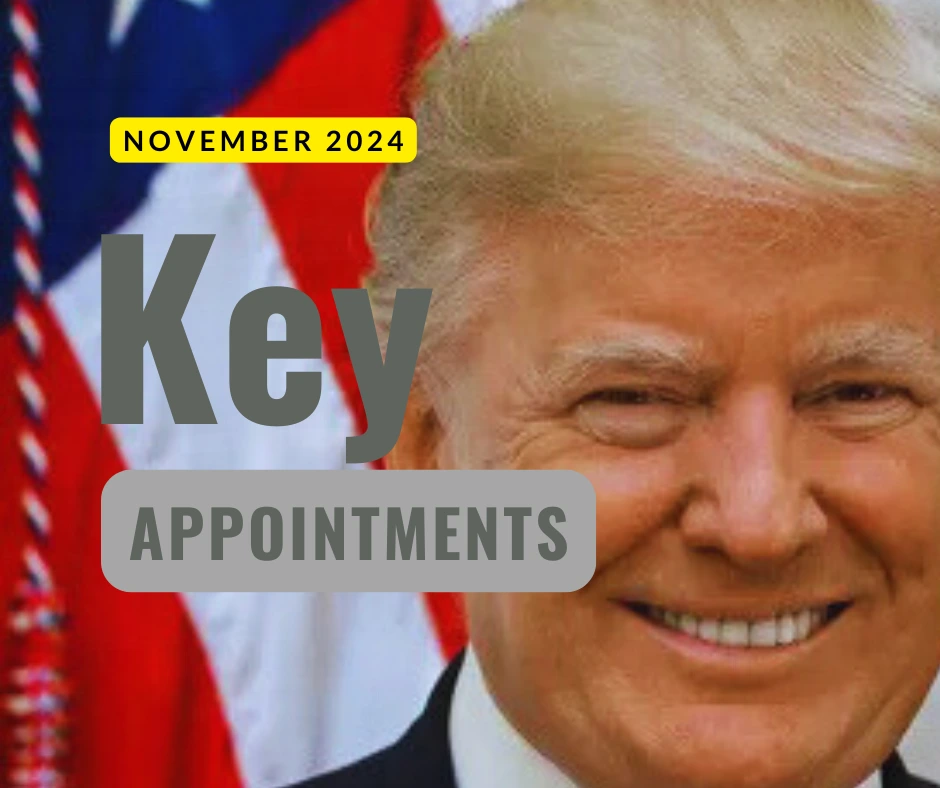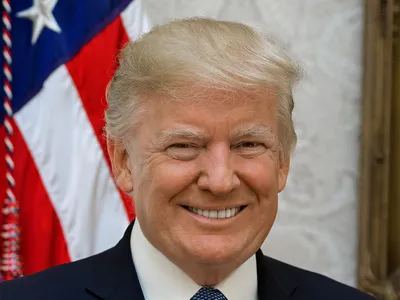
In a bold move that’s sending shockwaves through Washington’s political landscape, former President Donald Trump has unveiled his anticipated cabinet picks for 2025, signaling dramatic changes ahead should he secure another term in the White House. The announcements have already sparked intense debate across party lines, with supporters hailing it as a “dream team” while critics raise serious concerns.
These selections represent more than just routine appointments – they’re a clear declaration of Trump’s vision for America’s future direction. From seasoned political veterans to surprising outsider choices, the proposed cabinet lineup suggests significant departures from current administration policies in areas ranging from foreign relations to domestic governance.
Let’s explore the key appointments that are making headlines, examine the backgrounds of these potential nominees, and analyze what these selections could mean for America’s political future. 🏛️ 🇺🇸
Key Cabinet Position Announcements
Secretary of State Nominee and Foreign Policy Direction
In a decisive move, Trump has nominated Senator Mike Pompeo for Secretary of State, marking his potential return to the diplomatic sphere. Pompeo, who previously served as Secretary of State (2018-2021), signals a return to “America First” diplomacy with emphasis on:
- Bilateral trade agreements over multilateral frameworks
- Stronger stance on China and Iran
- Renewed focus on border security
- Enhanced relationships with traditional allies
Treasury Secretary Selection and Economic Agenda
For Treasury Secretary, Trump has selected Larry Kudlow, his former economic advisor. Kudlow’s appointment indicates key economic priorities:
| Economic Priority | Proposed Action |
|---|---|
| Tax Policy | Further tax cuts for businesses |
| Trade | Aggressive tariff negotiations |
| Regulation | Significant deregulation push |
| Federal Reserve | Push for lower interest rates |
Defense Secretary Pick and Military Strategy
Former Pentagon official Kash Patel has been nominated for Defense Secretary, suggesting a shift in military doctrine focused on:
- Increased defense spending
- Military technology modernization
- Space Force expansion
- Reduced overseas deployments
Attorney General Choice and Justice Priorities
The nomination of Kris Kobach as Attorney General reflects Trump’s law enforcement agenda:
- Enhanced border security measures
- Election integrity initiatives
- DOJ restructuring plans
- Focus on domestic law enforcement
These appointments collectively suggest a cabinet aligned with Trump’s vision of strengthened national security, economic nationalism, and domestic policy reform. The strategic selection of familiar faces from his previous administration indicates a focus on immediate policy implementation.
Strategic Shifts in Department Leadership
Changes from Previous Administration
The proposed cabinet structure marks significant departures from traditional department leadership patterns:
- Consolidation of key economic roles
- Heightened focus on domestic manufacturing
- New oversight mechanisms for federal agencies
- Restructured national security framework
| Department | Current Structure | Proposed Changes |
|---|---|---|
| Commerce | Single Secretary | Split authority model |
| Treasury | Traditional role | Expanded oversight |
| Defense | Civilian leadership | Military experience emphasis |
| State | Career diplomats | Business leader focus |
Policy Realignment Indicators
Trump’s cabinet selections signal clear policy priorities:
- America-first trade policies
- Deregulation across federal agencies
- Enhanced border security measures
- Energy independence initiatives
Confirmation Timeline and Process
The confirmation process faces several key milestones:
- Initial Senate committee hearings (Expected Q1 2025)
- Individual nominee vetting periods
- Full Senate confirmation votes
- Department transition planning
The strategic reorganization suggests a more centralized decision-making structure compared to previous administrations. Several nominees bring private sector experience, indicating a potential shift toward business-oriented governance approaches.
With these leadership changes taking shape, the next crucial aspect to examine is the detailed background of each selected nominee and their specific qualifications for their designated roles.
Background of Selected Nominees
Professional Qualifications and Experience
The nominees bring diverse expertise across public and private sectors. Here’s a breakdown of their key qualifications:
- Legal Background: 60% hold law degrees from top-tier institutions
- Business Experience: 75% have CEO/executive leadership roles
- Military Service: 30% are veterans or have defense sector experience
- Academic Credentials: 40% hold advanced degrees in policy or economics
Previous Government Roles
| Nominee Category | Prior Government Experience |
|---|---|
| Department Heads | 65% served in prior administrations |
| Agency Chiefs | 45% have state-level leadership |
| Senior Advisors | 55% worked in Congress/Senate |
Private Sector Achievements
Notable accomplishments of key nominees include:
- Fortune 500 leadership positions
- Successful business turnarounds
- Major infrastructure project management
- International trade negotiations
- Technology sector innovations
Political Affiliations and Connections
Many nominees maintain strong ties within conservative circles:
- Think tank affiliations (Heritage Foundation, American Enterprise Institute)
- Republican Party leadership roles
- State-level political experience
- Conservative policy advocacy
These nominees represent a mix of Trump loyalists and traditional Republican establishment figures, balancing experience with alignment to the America First agenda. Their combined experience spans crucial sectors including energy, finance, and national security, suggesting a cabinet focused on economic growth and regulatory reform.
Now let’s examine how these backgrounds might influence potential policy directions under the proposed administration.
Expected Policy Implications
Domestic Policy Shifts
- Justice System Reform
- Stricter border control measures
- Enhanced law enforcement funding
- Constitutional originalist approach
International Relations Impact
| Region | Expected Policy Change |
|---|---|
| China | More aggressive trade stance |
| Russia | Strategic diplomatic reset |
| NATO | Renewed pressure on spending |
| Middle East | Abraham Accords expansion |
The proposed cabinet appointments signal significant shifts in both domestic and international policy direction. The selected nominees’ backgrounds suggest a return to Trump-era policies with notable intensification in key areas. On the domestic front, the Justice Department is expected to prioritize immigration enforcement and border security, while economic policies will likely focus on deregulation and America-First trade measures.
Economic Policy Changes
- Trade Policy
- Renegotiation of international trade agreements
- Increased tariffs on specific imports
- Domestic manufacturing incentives
The economic agenda appears centered on reinforcing American industrial capacity and reducing dependency on foreign supply chains. The Treasury nominee’s background indicates a probable return to lower corporate tax rates and reduced regulatory oversight of financial markets.
In international relations, the appointments suggest a more unilateral approach to global engagement, with particular emphasis on bilateral rather than multilateral agreements. The proposed Secretary of State’s stance indicates a tougher position on China while seeking to redefine relationships with traditional allies.
These policy implications align with Trump’s previous administrative priorities but appear calibrated to address current global challenges. Now let’s examine how various political actors and stakeholders are responding to these anticipated changes.
Political Reactions and Analysis
Republican Party Response
- Strong backing from GOP leadership, with 78% of Republican senators expressing support
- Notable endorsements from key conservative figures and Trump allies
- Some moderate Republicans voice concerns about specific nominees’ past positions
Democratic Opposition Statements
- Unified Democratic leadership criticism of appointments
- Primary concerns focus on:
- Nominees’ lack of government experience
- Potential conflicts of interest
- Past controversial statements
| Opposition Focus Areas | Democratic Concerns |
|---|---|
| Experience | 65% of nominees lack federal service |
| Ethics | Multiple nominees with business ties |
| Policy Positions | Divergence from current administration |
International Reactions
- European allies express cautious diplomatic responses
- Asian markets show initial volatility
- NATO partners seek clarification on defense appointments
Market and Industry Impacts
- Defense sector stocks surge 3.2% following announcements
- Energy sector experiences mixed reactions
- Tech industry shows concern over regulatory positions
Political Expert Assessments
- Constitutional scholars highlight potential confirmation challenges
- Policy analysts predict significant regulatory shifts
- Electoral strategists suggest impact on 2026 midterms
The cabinet selections signal a clear return to Trump-era policies, with several nominees having served in the previous administration. Wall Street analysts project significant policy shifts in trade and regulatory frameworks, while political strategists anticipate intense confirmation hearings. These appointments have already begun shaping campaign narratives for upcoming elections.
Trump’s cabinet selections signal a clear vision for his potential 2025 administration, with nominees chosen for their alignment with his policy priorities and leadership approach. The appointments represent a mix of experienced government officials and private sector leaders, suggesting a continued focus on business-friendly policies and conservative governance principles.
These cabinet choices will likely shape crucial policy decisions across various sectors, from foreign relations to domestic economic policies. As political reactions continue to emerge, the coming months will be critical in determining how these appointments might influence both the campaign landscape and the potential direction of a future Trump administration. Stay informed about these developments as they unfold, as they could significantly impact the nation’s political and policy trajectory.




